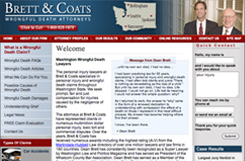Share Your Story
Click here to share your story about drunk driving.
On July 17th, 2003 at 1 a.m. while working a vehicle accident, I was struck by a drunk driver. I lost everything I had. My wife left, as 1 year of watching me have seizures and not get better was too much for her. More
Drunk Driving News
Drunk Driving Fatalities Drop to Lowest Rate since 1950
The U.S. Department of Transportation recently announced that U.S. fatalities due to drunk driving fell to a record low number in 2009, declining by 7.4% from 2008, with a 19% decrease since 2000. This represents the lowest number since 1950. More
Drug and Alcohol Courts: An Effective Alternative to Jail
Drug courts were developed in the 1980's in an effort to stop the abuse of alcohol and other drugs, and to reduce the criminal activity that typically accompanies these behaviors. More
Hold Drunk Drivers Responsible
Overview of the Criminal Process
When a drunk driver is involved in an accident and is apprehended by police, it is almost inevitable that this offender will become involved in the criminal justice system. What follows is a brief, practical overview of how cases involving drunk drivers are handled in Washington State. Other states will have different rules, but since all states evolved their laws from English common law, there are enough similarities for this guide to be helpful for other states.
A drunk driver apprehended by police will be charged with one of a number of different alcohol-related driving offenses.
Vehicular Homicide: If a drunk driver is in an accident that kills someone, a passenger in their own car, or another driver or a pedestrian, he can be charged with Vehicular Homicide. This is a Class A felony, the most serious under Washington law, and carriers a maximum penalty of life in prison. However, it is important to note that offenders in Washington are sentenced according to a “standard range penalty.” The standard range penalty is arrived at by performing a series of calculations established by the Washington State legislature. The bottom line is, depending on a drunk driver’s criminal history, the offender will likely be sentenced anywhere from 31 months in prison for a first time offender to 171 months or more for someone with an extensive criminal history. You can contact the prosecutor to give you a preliminary idea of what the presumptive sentence is for the drunk driver. Brett & Coats can also help you make these calculations if you are unable to reach the prosecutor.
Vehicular Assault: If a drunk driver is in an accident that causes “substantial bodily harm” to another person, he can be charged with vehicular assault. The term “substantial bodily harm” has been defined by the law as a “temporary but substantial disfigurement, substantial impairment of the function of any bodily part, or a fracture of any bodily part.” This includes any broken bones, any permanent injuries including scars, or other types of serious injuries. The reality is that even if the law would support a conviction for vehicular assault, the prosecutor may choose not to pursue vehicular assault charges for any number of reasons. If it is important to you that an offender be charged with vehicular assault, contact your local prosecuting attorney’s office and inform them of your wishes. We can also assist you in working with the prosecutor to ensure that an offender is charged appropriately.
Vehicular Assault is a Class B felony in Washington. That means that the maximum penalty for this offense is 10 years in prison. Again, as was discussed above, offenders in Washington are sentenced according to a “standard range penalty” set by the Washington State Legislature. The penalty imposed is based on an offender’s criminal history. Depending on that history, an offender can expect a standard range penalty from three months in county jail for first time offenders to 84 months in prison for an offender with an extensive criminal history. You can contact the prosecutor to give you some idea of the standard range penalty that applies to your case, or we can often assist you in making these calculations.
Driving Under the Influence: Anyone who drives with a blood-alcohol concentration in excess of .08, or who is apparently intoxicated, can be charged with DUI. DUI is a gross misdemeanor. What that means is that the maximum penalty is 365 days in county jail. There are mandatory minimum jail penalties which apply to DUIs. A first-time offender is required to serve at least one day in jail. If the offender has a prior DUI within seven years, the mandatory minimum penalty is 30 days jail and an additional period of electronic house arrest. The mandatory penalties continue to escalate if the offender has additional prior DUIs. If an offender has four prior DUI convictions within 10 years, that offender can be charged with felony DUI. There are no sentencing guidelines for gross misdemeanors; the prosecutor will typically have discretion to impose any penalty from one day to 365 days in county jail. Any conviction for DUI in Washington State also requires the offender to undergo five years of probation, attend a victim impact panel, and abstain from drinking alcohol. Suspension or revocation of the offender’s driver’s license is also a mandatory penalty associated with a DUI conviction.
Often, if a drunk driver causes an accident that results in a less serious injury, a prosecutor will elect to charge that offender with DUI instead of Vehicular Assault. Typically, in a drunk-driving crash that causes injuries, the prosecutor will seek additional jail time above the mandatory minimum penalty. If you wish to see an offender sentenced aggressively, you should contact the local prosecutor and describe how the accident has affected you or your family and why additional jail time is appropriate.
Reckless Driving; Negligent Driving 1st Degree: Often, first time DUI offenders will be offered a reduction to Reckless Driving or Negligent Driving 1st Degree. This is usually offered only to first-time offenders who have little criminal history and who did not display poor driving or cause an accident. The offender will typically serve the mandatory minimum penalty and a term of probation. Unless there are serious problems with a case, such as a lack of evidence, you will very rarely see a drunk driver offered these reductions if they have caused an accident that involved even minor injuries.
It is also a crime to drive a boat or other watercraft while under the influence. The penalties associated with boating under the influence, homicide by watercraft, or assault by watercraft track the Vehicular Homicide, Vehicular Assault, and DUI penalties.
Once an offender has been charged with an offense they will usually be taken to jail. The offender will be booked into jail and bail will be set. Bail is a sum of money that the offender can post in order to be released from jail during the time leading up to his or her trial date. If the offender cannot post bail they will remain in jail pending a trial or guilty plea. The offender has the option in Washington to post a “bail bond” through a bail bondsman. Usually, the offender will post 10% of the total bail as a non refundable fee and the bondsman will post the remainder. The offender will be released to the community pending trial or a guilty plea.
The offender will have the opportunity to hire a lawyer at this point or will be appointed a lawyer from the local public defender’s office if they cannot afford to hire a lawyer. The attorney and prosecutor will engage in negotiations in the ensuing weeks, months, or even years leading up to the trial date. The offender’s lawyer will request that the prosecutor reduce the charges against the offender or recommend a shorter jail penalty. The offender’s lawyer will provide the prosecutor with information justifying more lenient treatment. Remember, prosecutors usually handle hundreds of cases at any one time often involving sexual offenses, serious domestic violence charges, and intentional homicides. The State simply does not provide adequate courtroom space or prosecutorial resources for prosecutors to take every case to trial. The prosecutor has to convince most of the offenders they are prosecuting to plead guilty. An offender will typically not plead guilty unless some reduction in the charge or the penalty is offered by the prosecutor. If you want to see a drunk driver sentenced aggressively for hurting your or someone else, you need to talk to the prosecutor about the reasons that your case is not appropriate for a reduction. An attorney your hire to help you in your civil claim can often also work with the prosecutor to see that justice is done in the criminal case against the drunk driver.
If an offender elects to plead guilty, all that will be left is sentencing for the crime. Victims of a drunk driver have the right to attend the sentencing hearing and present testimony regarding the impact of the offender’s actions on their lives. A victim can also submit a victim impact statement to the court for review when considering sentencing. If a drunk driver that hurt you or your family is going to be sentenced, review the information above concerning the likely standard range penalties, or call us to discuss your situation and we can help give you answers.
If the offender refuses to plead guilty, then what will follow is a jury trial. If you have been injured by a drunk driver, you will almost certainly be called on to testify at the trial. The prosecutor will question you, and the defense will have an opportunity to cross examine you. At the close of the trial, if the offender is found not guilty, they will be released. If they are found guilty, then they will be sentenced. Again, you have the right to attend the trial and sentencing and submit a victim impact statement, or provide testimony regarding an appropriate sentence for the offense.
Remember, the judge has the ultimate say in what sentence the offender is to receive within the standard range penalty discussed above. The judge’s decision is constrained by this standard range penalty established by the Washington State legislature. No matter what you say, unless certain extraordinary conditions are met the judge cannot sentence the offender outside the standard range penalty. This can be very frustrating for victims seriously injured by a drunk driver who may only be sentenced to a few months in jail. This is why it is so important to also hold these drunk drivers responsible for the damage they cause through a civil lawsuit. This is what we do. We sue drunk drivers. We make sure that drunk drivers are forced to make up for the injuries and damage they cause. We make sure that the people who allow these drunk drivers to get back on the road again and again are held responsible. We use the most powerful tool available in the United States, money, to make sure that the drunk driver that hurt you and your family will never do it again, and that those who enabled that drunk driver think twice before they cut corners or bend the law again. This can be the legacy of your pain and the pain of your family.




